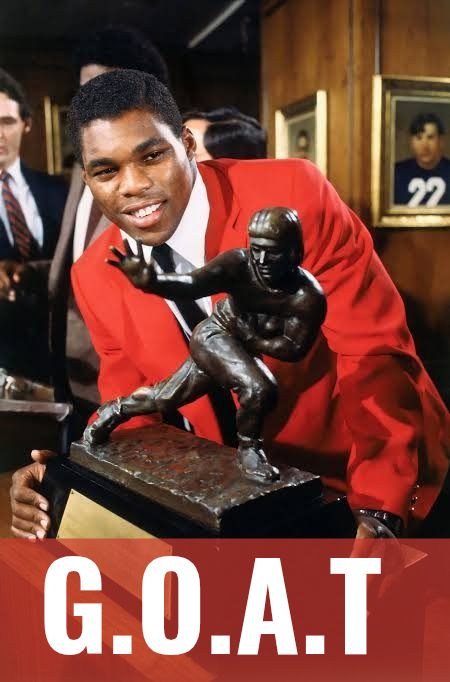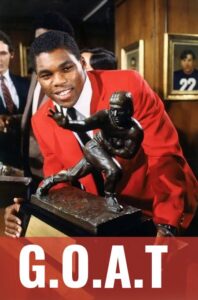
In a historic moment for college football, legendary Georgia running back Herschel Walker has been voted the greatest college football player of all time. Surpassing notable names such as Florida Gators quarterback Tim Tebow, Auburn’s Bo Jackson, and even the great Barry Sanders, Walker’s selection is a testament to his extraordinary career and the lasting impact he had on the game. This accolade not only recognizes his prowess on the field but also acknowledges his role in shaping the landscape of college football and inspiring generations of athletes. In this analysis, we explore the significance of this vote, the career of Herschel Walker, and why his legacy stands unparalleled in college football history.
Herschel Walker’s career began at the University of Georgia, where he quickly became a force to be reckoned with. He played for the Bulldogs from 1980 to 1982, and in that relatively short period, he reshaped the game and the role of the running back in college football. His impact was immediate and profound.
Walker’s freshman year, in 1980, was a breakthrough moment not only for him personally but also for Georgia football. He led the Bulldogs to a national championship, carrying the team with his explosive running ability. His 1,616 rushing yards and 15 touchdowns that season made him the focal point of Georgia’s offense and an early signal that he was a player of exceptional talent. His physicality, combined with his speed and vision, allowed him to break through defenses in ways that had never been seen before.
By his sophomore season, Herschel Walker had already established himself as one of the most dominant players in college football history. His numbers continued to soar, and his impact on the field grew larger with each game. He would go on to set multiple records during his career, including Georgia’s all-time rushing record (which stood for many years) and securing his place in the College Football Hall of Fame.
Walker’s performances were often nothing short of mesmerizing. His combination of power, agility, and endurance made him nearly impossible to stop. Even in an era where the running back was often considered the heart of a team’s offense, Walker’s abilities stood head and shoulders above the rest. His 1981 season, where he rushed for 1,891 yards and 18 touchdowns, remains one of the most impressive single-season performances in the history of the sport.
To understand why Herschel Walker was so successful on the field, we must look at the rare physical traits that set him apart from other college football players, both in his era and in subsequent decades.
At 6’1″ and 225 pounds, Walker possessed a rare blend of size and speed that few athletes could match. His physicality was such that defenders often struggled to tackle him. But what made him unique was his ability to maintain a sprinter’s speed despite his muscular build. Walker could run the 40-yard dash in an astonishing 4.3 seconds, which is lightning fast for someone of his size.
Furthermore, his endurance and work ethic were legendary. Walker’s stamina allowed him to carry the ball over 30 times in a game without showing signs of slowing down. His conditioning was as much a part of his game as his running ability, and it allowed him to dominate in the fourth quarter, when many other players would tire.
What separated Herschel Walker from his contemporaries was the way he maximized his natural gifts. He wasn’t just big and fast; he was incredibly intelligent about how he played the game. His ability to read defenses, set up blocks, and make quick decisions helped him rack up yardage at a jaw-dropping rate.
Throughout his college career, Herschel Walker set numerous records, many of which have since been surpassed but still remain significant milestones. He finished his college career with 5,259 rushing yards, which was the second-highest total in college football history at the time (behind only Billy Sims). He was also the first player in college football to rush for over 1,000 yards in each of his three seasons, a feat that highlighted his consistent excellence.
Walker’s 1982 season, his final year at Georgia, solidified his place in college football lore. That year, he rushed for 1,752 yards and 16 touchdowns while leading Georgia to an 11-1 record and a Sugar Bowl victory. Walker’s final college game was a dominating performance in the Sugar Bowl against a tough Pittsburgh team, where he rushed for 150 yards and two touchdowns, further cementing his legacy.
He finished third in the 1982 Heisman Trophy voting, a recognition that, while impressive, many feel did not fully encapsulate his dominant play. In the context of the time, the Heisman was often awarded to quarterbacks or wide receivers, and Herschel’s sheer physical dominance as a running back often was undervalued. However, in retrospect, many argue that Walker’s accomplishments throughout his career should have earned him a Heisman that year.
Though he never won a second Heisman Trophy, Walker’s college football achievements are still among the most illustrious in history. His Heisman-winning season in 1982 remains one of the finest individual seasons for any college football player. His Heisman victory solidified his place among the legends of the game and also made him a household name.
After leaving Georgia, Walker embarked on a career in the National Football League (NFL), where he would go on to achieve even greater heights, including being named an NFL MVP and helping lead the Dallas Cowboys to multiple Super Bowls. However, his impact on college football and his reputation as one of the greatest to ever play the game is largely due to his time at Georgia, where his blend of power, speed, and vision helped define an era of college football.
Herschel Walker’s career at Georgia was more than just about the records he set or the accolades he accumulated; it was about how he changed the game. In a time when running backs were essential to a team’s success, Walker brought a level of athleticism and versatility that had never been seen before. His combination of power and speed influenced the way teams viewed the running back position, inspiring future generations of athletes to push the boundaries of what was possible.
Beyond the physical aspects of his game, Walker’s character and determination also played a key role in his success. He was known for his relentless work ethic, his focus on discipline, and his unwavering commitment to his team. This attitude helped set a new standard for what it meant to be a college athlete. For many players who followed, Walker was the benchmark for excellence.
While Walker is now widely regarded as the greatest college football player of all time, his legacy is often compared to the achievements of other legendary players. Tim Tebow, the Heisman-winning quarterback from Florida, is often mentioned in the same breath as Walker. Tebow, like Walker, transcended the college football landscape, leading Florida to national championships and becoming one of the most beloved and respected figures in college football history. Yet, despite Tebow’s impact and success, many argue that Walker’s all-around dominance and his ability to control a game from the running back position place him above all others.
Bo Jackson, the multi-sport star from Auburn, is another name frequently mentioned in the conversation. Jackson’s combination of speed and power was equally as awe-inspiring as Walker’s, and his dominance on both the football field and baseball diamond make him one of the most unique athletes in history. However, Walker’s sheer dominance over three seasons in college football, as well as his ability to play at a consistently high level, often edges out Jackson in terms of his college football legacy.
Other players like Barry Sanders, who had one of the most iconic seasons in college football history in 1988, are often viewed as comparables. Sanders’ 2,628 rushing yards and 37 touchdowns during his Heisman-winning season were truly remarkable, but he played only one standout season in college football. In contrast, Walker’s sustained excellence over three seasons arguably gives him the edge in this debate.
Herschel Walker’s impact on college football cannot be overstated. His combination of physical attributes, mental toughness, and on-field success set him apart from every other player in the history of the sport. He was more than just a player; he was a phenomenon. His achievements on the field were nothing short of extraordinary, and his legacy is one that continues to resonate in college football to this day.
As the greatest college football player of all time, Walker’s place in the pantheon of legends is secured. His name will forever be associated with the very best that college football has ever seen. In a sport full of incredible talent, Herschel Walker’s greatness shines as brightly as ever, and his place atop the list of all-time greats is a fitting tribute to a career that will never be forgotten.
This draft could be expanded further by diving deeper into specific games, his personal life, his post-college career, or other aspects of his influence. Let me know if you’d like to focus on any particular angle!





